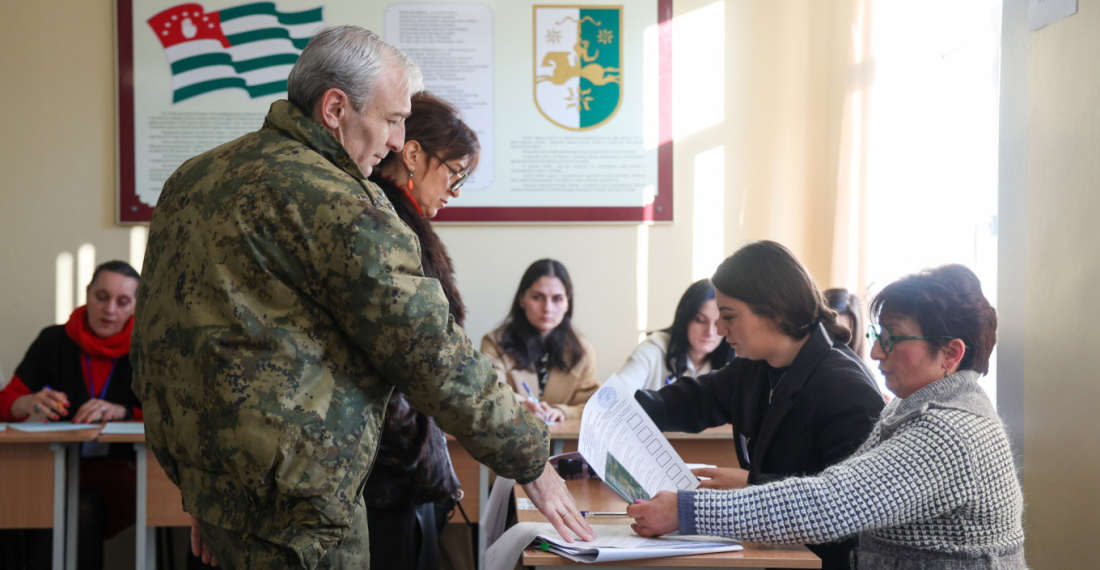Abkhazia, a territory that broke away from Georgia in 1993, is holding early presidential elections today following the ousting of the previous president, Aslan Bzhania, at the end of November 2024. The outcome of the elections could determine the future trajectory of the region’s foreign policy and its relationship to Moscow. Bzhamia was forced to resign after thousands of supporters of opposition leader Adgur Ardzinba forcibly occupied the presidential palace and parliament building. Ardzinba is contesting these elections with his main rival being former Vice President Badra Gunba who is supported by Moscow. According to pre-election polls, Gunba is projected to receive 42.3 percent of the vote, while Ardzinba is projected to receive just 27.3 percent of the vote. The other three candidates are Shamil Ardzinba, Oleg Bartsits, and Adgur Khurkhumal.
The opposition had accused Bzhania and his administration of making concessions to Russia that were unacceptable to Abkhaz society. One of these concessions included allowing the construction of Russian settlements in Abkhazia, which could change the demographic situation in favor of Russians. In response to the latest Abkhaz revolution, the fourth since 2004, the Russian government stopped financial aid to Abkhazia, refused to supply electricity during the cold winter, and began stripping some opposition leaders of their Russian citizenship.
Moscow is trying to ensure Gunba’s victory in the first round so as not to risk its position and influence in Abkhazia. Russian Foreign Minister Sergei Lavrov met with Gunba on February 6, demonstrating Moscow’s support for his candidacy. On the other hand, Adgur Ardzinba has significantly boosted his ratings by leading the coup that resulted in the ousting of Aslan Bzhania. He presents himself as the successor to the legacy of Abkhazia’s first president and his namesake, Vladislav Ardzinba.
If Gunba and Ardzinba represent two irreconcilable political camps that have alternated in power for the past twenty years, the other two presidential candidates in this election, former Abkhazian trade representative in Russia Oleg Bartsits and ex-head of the republic’s audit chamber Robert Arshba, position themselves as a third force. Given the public’s growing fatigue with the ongoing struggle between the two dominant and perpetually feuding political groups, both Bartsits and Arshba have a realistic chance of making it to the second round. The fifth contender in the race, banker Adgur Khurkhumal, is a wildcard and a clear outsider. Few people know him, he lacks a clear programme, and his chances of winning the presidency are virtually nonexistent.
The newly elected president of Abkhazia will face two major challenges. The first is the urgent need for constitutional reform. The current model of strong presidential authority no longer fits the existing political landscape and repeatedly leads to internal crises. The second challenge is managing relations with Moscow. Russia is effectively Abkhazia’s only ally, its security guarantor, and its main trade and economic partner. Moreover, 40 per cent of Abkhazia’s budget revenue comes from Russian subsidies.
Russia has its own interests in Abkhazia, primarily linked to its economic potential. It was this economic interest, embodied in the Russian-Abkhazian investment agreement, that became the focal point of the current political crisis, ultimately leading to the coup and the resignation of Aslan Bzhania.
Meanwhile, in a statement released on 15th February, the European External Action Service expressed support for the territorial integrity and sovereignty of Georgia, as recognised by international law. It said that regarding the so-called presidential elections that took place in the Georgian occupied breakaway region of Abkhazia on 15 February 2025, it recalled that the European Union does not recognise the constitutional and legal framework in which they took place. The EU will continue to pursue its policy of non-recognition and engagement, it concluded.






